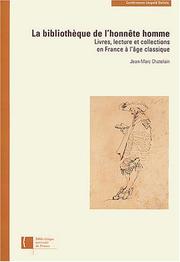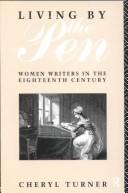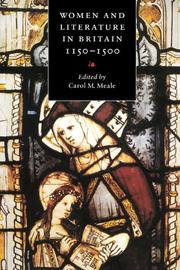| Listing 1 - 9 of 9 |
Sort by
|
Book
ISBN: 1526118009 1526117991 9781526118004 9781526118011 1526118017 Year: 2017 Publisher: Manchester Manchester University Press
Abstract | Keywords | Export | Availability | Bookmark
 Loading...
Loading...Choose an application
- Reference Manager
- EndNote
- RefWorks (Direct export to RefWorks)
This book traces affinities between digital and medieval media, exploring how reading functioned as a nexus for concerns about increasing literacy, audiences' agency, literary culture and media formats from the late fourteenth to the early sixteenth centuries. Drawing on a wide range of texts, from well-known poems of Chaucer and Lydgate to wall texts, banqueting poems and devotional works written by and for women, Participatory reading argues that making readers work offered writers ways to shape their reputations and the futures of their productions. At the same time, the interactive reading practices they promoted enabled audiences to contribute to -- and contest -- writers' burgeoning authority, making books and reading work for everyone.
English literature --- Reading --- Literature and society --- History and criticism. --- History --- Language arts --- Elocution --- Study and teaching --- Literature --- reading --- readers --- digital media --- textuality --- reading history --- Chaucer --- Lydgate --- bodies or embodiment --- time --- movement or mobility --- England --- Geoffrey Chaucer --- John Lydgate --- Manuscript --- Medieval literature
Periodical
ISSN: 0719997X Year: 2018 Publisher: Santiago, Chile : Ariadna Ediciones,
Abstract | Keywords | Export | Availability | Bookmark
 Loading...
Loading...Choose an application
- Reference Manager
- EndNote
- RefWorks (Direct export to RefWorks)
Printing --- Learning and scholarship --- History --- Erudition --- Scholarship --- Civilization --- Intellectual life --- Education --- Research --- Scholars --- Printing, Practical --- Typography --- Graphic arts --- history --- book history --- reading history --- latin america --- Printing. --- Learning and scholarship. --- Latin America. --- Asociación Latinoamericana de Libre Comercio countries --- Neotropical region --- Neotropics --- New World tropics --- Spanish America
Book
ISBN: 022646928X Year: 2019 Publisher: Chicago : University of Chicago Press,
Abstract | Keywords | Export | Availability | Bookmark
 Loading...
Loading...Choose an application
- Reference Manager
- EndNote
- RefWorks (Direct export to RefWorks)
A thorough rethinking of a field deserves to take a shape that is in itself new. Interacting with Print delivers on this premise, reworking the history of print through a unique effort in authorial collaboration. The book itself is not a typical monograph-rather, it is a "multigraph," the collective work of twenty-two scholars who together have assembled an alphabetically arranged tour of key concepts for the study of print culture, from Anthologies and Binding to Publicity and Taste. Each entry builds on its term in order to resituate print and book history within a broader media ecology throughout the eighteenth and nineteenth centuries. The central theme is interactivity, in three senses: people interacting with print; print interacting with the non-print media that it has long been thought, erroneously, to have displaced; and people interacting with each other through print. The resulting book will introduce new energy to the field of print studies and lead to considerable new avenues of investigation.
Printing --- Intermediality --- History --- History. --- print, reading, history, historical, author, authorial collaboration, monograph, multigraph, key concepts, cultural studies, culture, books, media, ecology, 18th century, interactions, printing, intermediality, advertising, anthology, binding, catalogs, conversations, engraving, indexes, letters, manuscripts, marking, paper, proliferation, spacing, stages, thickening, ephemerality.
Book
ISBN: 9782375461099 2375461096 2375461118 Year: 2020 Publisher: Villeurbanne: Presses de l'ENSSIB,
Abstract | Keywords | Export | Availability | Bookmark
 Loading...
Loading...Choose an application
- Reference Manager
- EndNote
- RefWorks (Direct export to RefWorks)
La lecture tient une place particulière dans les spéculations philosophiques et politiques des premiers socialistes. Le livre est à la fois le moyen de diffusion des idées progressistes et celui d'augmenter les connaissances de la population. Etienne Cabet, Charles Fourier, Jules Gay, Robert Owen, Pierre-Joseph Proudhon, Flora Tristan... tous ont mis le livre et la lecture au cœur de leurs préoccupations, de leurs rêves, de leurs débats, parfois de leur pratique.0Certains ont participé aux débats sur les droits d'auteur, d'autres se sont efforcés d'investir les bibliothèques populaires d'où une certaine philanthropie bourgeoise les écartait, d'autres encore ont cherché à mettre leurs idées en application, avec plus ou moins de succès... En effet, non seulement l'émancipation par la lecture n'était pas un objectif partagé par tous, ou pas au moyen des mêmes œuvres, mais encore les intentions des bénéficiaires et des prescripteurs n'étaient-elles pas toujours concordantes.
Socialisme utopique --- Fouriérisme. --- Bibliothèques publiques --- Livres et lecture --- Culture populaire --- Cabet, Étienne --- Fourier, Charles --- Owen, Robert --- Proudon, Pierre-Joseph --- Tristan, Flora --- Familistère de Guise. --- Fouriérisme. --- Bibliothèques publiques --- Cabet, Étienne --- Proudhon, Pierre-Joseph --- Familistère de Guise. --- Bibliothèques -- Politique publique --- Socialisme --- Politique publique --- bibliothèque --- livre --- lecture --- socialisme --- Libraries --- Socialism --- Books and reading --- Government policy --- History --- Documentation and information --- History of civilization --- reading culture --- anno 1800-1899 --- History. --- Sociological aspects --- Books and reading - History. --- Books and reading - Sociological aspects - France. --- cultuurgeschiedenis --- Information Science & Library Science --- bibliothèque populaire --- bibliothèque privée --- communisme --- droit d'auteur --- émancipation --- utopie
Book
ISBN: 1282197150 9786612197154 3119167517 3484970286 9783484970281 9783484351165 3484351160 Year: 2008 Volume: 116 Publisher: Tubingen : Niemeyer,
Abstract | Keywords | Export | Availability | Bookmark
 Loading...
Loading...Choose an application
- Reference Manager
- EndNote
- RefWorks (Direct export to RefWorks)
Dirk Hempel opens his study with an overview of the development of literary societies in Germany, but also in other European countries and in the USA, basing his survey on recent theories from the historical and social sciences on the democratic social phenomenon of the association. In addition, he presents the first typology of the different forms of literary society. The main body of the study is devoted to an examination of numerous literary societies in 19th century Dresden. He enquires into their organisation and active members and the contents of the societies' activities.
Literature --- Middle class --- Bourgeoisie --- Commons (Social order) --- Middle classes --- Social classes --- Belles-lettres --- Western literature (Western countries) --- World literature --- Philology --- Authors --- Authorship --- Societies, etc. --- History --- Social conditions --- Germans --- Societies, etc --- Books and reading --- Dresden (Germany) --- Intellectual life --- Intellectual life. --- Drezno (Germany) --- Dráždʼany (Germany) --- Dresda (Germany) --- Landeshauptstadt Dresden (Germany) --- Drezden (Germany) --- Drježdźany (Germany) --- Dresde (Germany) --- 드레스덴 (Germany) --- Tŭresŭden (Germany) --- Дрезден (Germany) --- 德累斯顿 (Germany) --- Deleisidun (Germany) --- Dresdeno (Germany) --- Дрэздэн (Germany) --- Δρέσδη (Germany) --- Dresdn (Germany) --- Literature - Societies, etc - History - 19th century --- Germans - Books and reading - History - 19th century --- Dresden (Germany) - Intellectual life --- 19th century. --- Dresden. --- Literary societies.
Book
ISBN: 0228015863 0228015855 9780228015864 9780228015857 Year: 2022 Publisher: Montreal, Quebec : McGill-Queen's University Press,
Abstract | Keywords | Export | Availability | Bookmark
 Loading...
Loading...Choose an application
- Reference Manager
- EndNote
- RefWorks (Direct export to RefWorks)
It was neither the civilization of Renaissance Italy nor the printing press that created the modern world. Instead, it was reading. Through historical analysis and readings of Petrarch, Bruni, Valla, Reuchlin, Erasmus, Foxe and Milton, The Communion of the Book explores how literacy produced modern values, and how digital media threaten those values.
Books and reading --- Civilization, Modern. --- Humanism --- Literacy --- Reading. --- History. --- Adrian Johns. --- Aeneid. --- Benedict Anderson. --- Book of Martyrs. --- Elizabeth Eisenstein. --- English Levellers. --- English Revolution. --- Erasmus. --- Euripides. --- Greek tragedy. --- Harold Innis. --- John Foxe. --- John Lilburne. --- Joseph Henrich. --- Leonardo Bruni. --- Lorenzo Valla. --- Marshall McLuhan. --- Paradise Regained. --- Petrarch. --- Renaissance. --- Roman history. --- Samson Agonistes. --- Stanislas Deheane. --- Stationers Company. --- book history. --- classics. --- common law. --- continental jurisprudence. --- continuous reading. --- democracy. --- digital cognition. --- humanist historiography. --- humanist printers. --- incunabula. --- indexical reading. --- literacy rates. --- logos. --- media change. --- metaphor. --- metonymy. --- modernity. --- monopolies of knowledge. --- papyrus codex. --- papyrus scroll. --- parchment codex. --- philoglogy. --- print nations. --- reader neurology. --- reading history. --- sacramental theology. --- science printing. --- sermo.

ISSN: 16307798 ISBN: 2717722491 2717722254 271772222X 9782717722499 Year: 2003 Volume: *3 Publisher: Paris: Bibliothèque nationale de France,
Abstract | Keywords | Export | Availability | Bookmark
 Loading...
Loading...Choose an application
- Reference Manager
- EndNote
- RefWorks (Direct export to RefWorks)
Avant de se figer comme d'autres, et peut-être plus facilement encore que d'autres, dans des attitudes satisfaites et des conduites convenues, la figure de l'honnête homme est dans son exigence d'origine, au XVIIe siècle, une figure inquiète de la culture : inquiétude vécue non pas dans les affres de la souffrance et la douleur grandiloquente des idéaux ascétiques, mais portée avec gaieté et naturel, dans la discrétion d'un détachement amusé de lui-même - bref, inquiétude ayant rang d'ironie. C'est de cette ironie qu'il est ici question, des formes qu'elle prend dans la considération des livres et des effets qu'elle produit dans leur maniement. Bousculant les habitudes et les représentations établies par l'humanisme savant de la Renaissance, revendiquant le patronage provocateur de Montaigne qui prétendait avoir "peu de pratique avec les livres", l'honnête homme construit un nouveau modèle de bibliothèque né de l'ambition de reconduire toujours le monde hiératique et autoritaire de l'écrit au monde changeant et mobile de la vie. Aussi la "bibliothèque de l'honnête homme" est-elle entendue ici dans un sens large, qui envisage les diverses voies qu'emprunte la résolution du conflit des lettres et du monde : non seulement espace concret et arpentable des livres qu'on range sur les rayons d'une pièce désignée, qu'on classe en catégories (histoire et belles-lettres), qu'on distribue en genres (mémoires, livres de conversations, nouvelles galantes et historiques, etc.), qu'on relie de telle manière de préférence à telle autre, mais aussi métaphore des lectures idéales qu'on se prend à rêver d'être un prolongement naturel de l'entretien de vive voix - lectures menées, selon le mot de Montaigne, "par forme de conférence, non de régence", animées par la recherche d'une communication d'esprit au-delà de la transmission d'un savoir, comme un autre "art de conférer". Bibliothèque réelle et bibliothèque imaginaire à la fois, la bibliothèque de l'honnête homme s'affirme ainsi l'expression d'un rapport au livre bien déterminé, apparu dans les bagages d'une morale aristocratique. Certes les modes et les enjeux de sa formulation évoluent à mesure que se modifient aussi, des années 1630 aux années 1730, les conditions générales de l'expérience propres à chaque génération. Mais sous la diversité des formes adoptées, de la définition d'un nouvel art de lire conçu comme art de l'écoute jusqu'à l'apparition de pratiques inédites de collection, du rapport du lecteur au rapport de l'amateur ou "curieux", ne cesse de s'affirmer et se préciser la nature esthétique de cette relation. Contre la tradition humaniste qui envisageait la bibliothèque avant tout comme un corpus, l'honnête homme en fait d'abord une question de style.
Book history --- anno 1600-1699 --- anno 1500-1599 --- France --- Books and reading --- Livres et lecture --- History --- Histoire --- Intellectual life --- 027.1 <44> --- 840 "16" --- 095 <44> --- Particuliere bibliotheken. Familiebibliotheken. Personenbibliotheken--Frankrijk --- Franse literatuur--17e eeuw. Periode 1600-1699 --- Merkwaardige boekbanden--Frankrijk --- 095 <44> Merkwaardige boekbanden--Frankrijk --- 840 "16" Franse literatuur--17e eeuw. Periode 1600-1699 --- 027.1 <44> Particuliere bibliotheken. Familiebibliotheken. Personenbibliotheken--Frankrijk --- Book collecting --- Private libraries --- Home libraries --- Libraries, Private --- Libraries --- Book collectors --- Appraisal of books --- Books --- Choice of books --- Evaluation of literature --- Literature --- Reading, Choice of --- Reading and books --- Reading habits --- Reading public --- Reading --- Reading interests --- Reading promotion --- Bibliophily --- Book selection --- Collectors and collecting --- Antiquarian booksellers --- Bibliomania --- Appraisal --- Evaluation --- 16th century --- 17th century --- History. --- Library collection - Reading - Book history - France - 17th century. --- Books and reading - History --- France - Intellectual life - 17th century --- Honnete homme --- Classicisme --- Bibliotheques francaises --- Bibliotheques --- 17e siecle --- 18e siecle

ISBN: 0415044111 041511196X 0203160142 1280327510 1134832346 9780203160145 9786610327515 6610327513 9780415044110 9781134832347 9781280327513 1134832338 Year: 1992 Publisher: London ; New York : Routledge,
Abstract | Keywords | Export | Availability | Bookmark
 Loading...
Loading...Choose an application
- Reference Manager
- EndNote
- RefWorks (Direct export to RefWorks)
Living by the Pen traces the pattern of the development of women's fiction from 1696 to 1796 and offers an interpretation of its distinctive features. It focuses upon the writers rather than their works, and identifies professional novelists. Through examination of the extra-literary context, and particularly the publishing market, the book asks why and how women earned a living by the pen. Cheryl Turner has researched and lectured widely in the field of eighteenth-century women's writing.
820 "17" --- 82:396 --- Authors and publishers --- -Authorship --- -English fiction --- -Novelists, English --- -Women novelists, English --- -Women --- -Women and literature --- -Author and publisher --- Publishers and authors --- Publishing contracts --- Authorship --- Contracts --- Book proposals --- Copyright --- Literary agents --- Literature --- Human females --- Wimmin --- Woman --- Womon --- Womyn --- Females --- Human beings --- Femininity --- English women novelists --- English novelists --- English literature --- Authoring (Authorship) --- Writing (Authorship) --- Engelse literatuur--18e eeuw. Periode 1700-1799 --- Literatuur en feminisme --- History --- -Sex differences --- Women authors --- -History and criticism --- History and criticism --- Biography --- Books and reading --- -History --- -Bibliography --- Law and legislation --- English fiction --- Novelists, English --- Women and literature --- Women novelists, English --- Women --- Sex differences --- History and criticism. --- Biography. --- -Engelse literatuur--18e eeuw. Periode 1700-1799 --- 82:396 Literatuur en feminisme --- 820 "17" Engelse literatuur--18e eeuw. Periode 1700-1799 --- -82:396 Literatuur en feminisme --- Author and publisher --- Women authors&delete& --- England --- 18th century --- Great Britain --- Women novelists [English ] --- English fiction - Women authors - History and criticism. --- Women and literature - Great Britain - History - 18th century. --- Authors and publishers - Great Britain - History - 18th century. --- Women - Great Britain - Books and reading - History - 18th century. --- English fiction - 18th century - History and criticism. --- Women novelists, English - 18th century - Biography. --- Authorship - Sex differences. --- Sex differences.

ISBN: 052140018X 0585041601 9780585041605 9780511582073 0511582072 9780521400183 9780521576208 0521576202 9780511000898 0511000898 0511878427 Year: 1993 Volume: vol 17 Publisher: Cambridge Cambridge University Press
Abstract | Keywords | Export | Availability | Bookmark
 Loading...
Loading...Choose an application
- Reference Manager
- EndNote
- RefWorks (Direct export to RefWorks)
This collection of essays focuses on the questions of women's access to a written culture in medieval Britain and their representation within it. It explores women's engagement with Anglo-Norman, English and Welsh as well as Latin, and addresses issues including orality and literacy and women's exclusion from a written tradition. It considers the question of the levels of literacy attained by women, and contemporary attitudes to their acquisition of such skills, as well as the historical evidence for women's activity as writers, patrons and readers. It also examines the representation of women within different literary genres, both secular and religious - their possession or lack of power, and their roles as lovers, mothers and saints. This is the first such volume to focus on these issues within the specific framework of late medieval Britain, and as such constitutes a unique contribution to the study of women and medieval literary history.
Anglo-Norman literature --- British literature --- English literature --- Women and literature --- Women --- Women authors --- History and criticism. --- History --- Books and reading --- History. --- 82:396 --- 820 "13/16" --- 028-055.2 --- -English literature --- -Women --- -British literature --- -Women and literature --- -028-055.2 Vrouwelijke lezers --- Vrouwelijke lezers --- 82:396 Literatuur en feminisme --- Literatuur en feminisme --- Literature --- Human females --- Wimmin --- Woman --- Womon --- Womyn --- Females --- Human beings --- Femininity --- Inklings (Group of writers) --- Nonsense Club (Group of writers) --- Order of the Fancy (Group of writers) --- French literature --- 820 "13/16" Engelse literatuur--?"13/16" --- Engelse literatuur--?"13/16" --- -History and criticism --- History and criticism --- -Books and reading --- -History --- -Bibliography --- 028-055.2 Vrouwelijke lezers --- Women authors&delete& --- Books and reading&delete& --- Great Britain --- Middle English, 1100-1500 --- Literature [Medieval ] --- Middle Ages, 500-1500 --- Literatures --- Women and literature - Great Britain - History. --- English literature - Middle English, 1100-1500 - History and criticism. --- Anglo-Norman literature - Women authors - History and criticism. --- Literature, Medieval - Women authors - History and criticism. --- English literature - Women authors - History and criticism. --- Women - Great Britain - History - Middle Ages, 500-1500. --- Women - Great Britain - Books and reading - History. --- Great Britain - Literatures. --- Literature, Medieval --- British literature. --- European literature --- Medieval literature --- Old English literature --- anno 1200-1499 --- Arts and Humanities --- WOMEN AND LITERATURE --- ENGLISH LITERATURE --- ANGLO-NORMAN LITERATURE --- MEDIEVAL LITERATURE --- GREAT BRITAIN --- HISTORY --- MIDDLE ENGLISH, 1100-1500 --- WOMEN AUTHORS
| Listing 1 - 9 of 9 |
Sort by
|

 Search
Search Feedback
Feedback About UniCat
About UniCat  Help
Help News
News